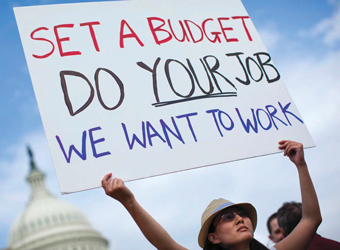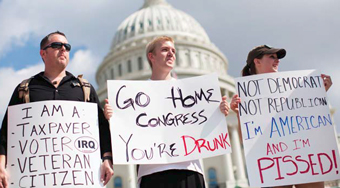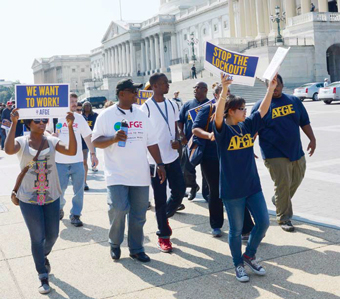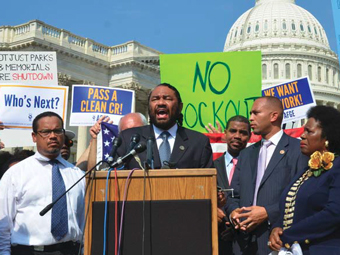Politics, disunity and hijacking government
By Askia Muhammad -Senior Editor- | Last updated: Oct 8, 2013 - 11:55:05 AMWhat's your opinion on this article?
A small group has already won increased power amid shutdown and budget showdown, say analysts

A woman who wished to be identified as Nancy, holds a sign during an event with the Democratic Progressive Caucus with furloughed federal employees blaming House Republicans on the government shutdown on Capitol Hill on Oct. 4 in Washington.
|
While most of the public's attention has been focused on getting federal workers back on the job, re-opening closed national parks and monuments, and recovering from the major impact the loss of worker revenue is having on the national economy, conservatives have been quietly consolidating their gains.
They managed to win virtually uncontested agreement to proceed with future budget negotiations using the drastically lower funding levels that fell into place when the budget “sequester” went into effect back on March 1, 2013.
The sequester is a series of annual spending cuts to the federal budget, from Fiscal Year (FY) 2013 to FY2021 which was agreed to by Democrats and Republicans in order to end the budget standoff of 2011. Negotiators agreed on the drastic cuts which will total as much as $2 trillion in automatic future spending cuts, because both sides thought the cuts which affect everything, including military spending, would spur legislators to agree on a more sensible plan of reductions and increased revenue from tax reform. But that agreement never came.

Protestors holds signs against the government shutdown on the West Front of the U.S. Capitol building on Capitol Hill on Oct. 4 in Washington.
|
On the surface of the budget squabble, President Obama continued to urge House Speaker John Boehner, (R-Ohio), to put a short-term spending bill with no strings attached on the House floor because he believes it will pass with the votes of most Democratic House members and a couple of dozen moderate Republicans. The Democrat-controlled Senate would agree to such a “clean” bill and the government shutdown would end.
Mr. Boehner remains firm in the position dictated to him by the small Tea Party Caucus of the House majority, refusing to let the full House vote on any measure that does not de-fund the Affordable Care Act (“Obamacare”), and reduce federal spending even more.
Mr. Boehner admitted that at first he did agree with Senate Majority Leader Harry Reid (D-Nev.) to a “clean” continuing resolution to keep the federal government running and to avoid the government shutdown. But then he said during an appearance on the ABC News program “This Week,” “I and my members decided the threat of Obamacare and what was happening was so important that it was time for us to take a stand. And we took a stand.”
President Obama has said repeatedly: “We’re not going to negotiate under the threat of further harm to our economy.” Not in order to end the government shutdown, and certainly he insisted, not to get Republican die-hards to agree to raise the debt limit, which is needed for U.S. borrowing authority to pay for old debts—more than $10 trillion worth just for wars in the 21st Century alone—and not for new expenditures.
The president and others have likened the Republican extremists’ conduct to “hostage taking,” Sen. Reid has described them as “anarchists.”

The US Capitol steps, Washington, D.C., October 4. On the fourth day of the government shutdown activists from the American Federation Of Government Employees (AFGE), SEIU, US Action, Creedo Action and other groups and their supporters rally and march to a nearby park. Photo: flickr.com/ Stephen D. Melkisethian
|
What true anarchists see in the unconventional struggle over the government shutdown and raising the debt limit is surprising. “What they see taking place is a transfer of power from one kind of oppression, by a government that at least pretends to be democratic, to another that has no such pretensions,” said Mr. Schneider. “They point out that the shutdown won’t stop the NSA from spying on us, or police from enforcing laws in discriminatory ways, or migrant workers and nonviolent drug users from being imprisoned at staggering rates.
“The parts of government that the shutdown strips away are among those that bring us closer to being a truly free, egalitarian society: food assistance to ensure that everyone can eat, health care that more people can afford, and even public parks, where some of our greatest natural treasures are held in common. Meanwhile, ever more power is being handed over to corporations that are responsible only to their wealthiest shareholders,” he said.
This is precisely what the Most Honorable Elijah Muhammad warned about. “The Great Commotion of the government and people of America; the civil unrest, insurrection, mental excitement, and noisy confusion—there is no action that is being taken, nor can there be any action taken, that will bring the people to a better condition of civil action,” Mr. Muhammad warned in 1973 in Chapter 53—The Great Commotion—in his book “The Fall of America.”

Congressmen Keith Ellison, left, and Al Green participate in protest over shutdown of federal government.
|
“So they already caved in once to the hostage-takers. This time, if Obama, as I fear he might, negotiates with them and they come up with some ‘grand bargain’ to cut Social Security or reduce Medicare cost growth or something, between now and Oct. 17 (when the debt ceiling of $16.9 trillion will be reached). They will see that as a victory. Right? This could become a regular tactic,” Mr. Lind continued.
“So (the Tea Party) will have essentially informally amended the U.S. Constitution, so that, from their perspective you pass all laws twice: once when they pass, and then they have to be passed again whenever these debt ceiling negotiations come up.”
INSIDE STORIES AND REVIEWS
-
-
About Harriett ... and the Negro Hollywood Road Show
By Rabiah Muhammad, Guest Columnist » Full Story -
Skepticism greets Jay-Z, NFL talk of inspiring change
By Bryan 18X Crawford and Richard B. Muhammad The Final Call Newspaper @TheFinalCall » Full Story -
The painful problem of Black girls and suicide
By Charlene Muhammad -National Correspondent- » Full Story -
Exploitation of Innocence - Report: Perceptions, policies hurting Black girls
By Charlene Muhammad -National Correspondent- » Full Story -
Big Ballin: Big ideas fuel a father’s Big Baller Brand and brash business sense
By Bryan Crawford -Contributing Writer- » Full Story






 Click Here Stay Connected!
Click Here Stay Connected!








